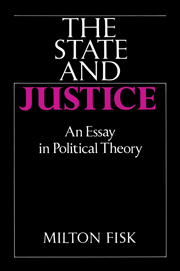Book contents
- Frontmatter
- Contents
- Preface
- Introduction: Can the state rule without justice?
- Part One An outline of a materialist political theory
- Part Two An assessment of the place of justice in the state
- Part Three A functional view of political institutions
- 11 On functional explanation
- 12 Power and function
- 13 Democracy, its bright and its dark sides
- 14 Welfare capitalism
- 15 The new mercantilism
- 16 Organized labor and the state
- Part Four An account of the community of states
- Part Five A reflection on the transition to a new kind of state
- Conclusion: State, class, and democracy
- Notes
- Index
11 - On functional explanation
Published online by Cambridge University Press: 06 July 2010
- Frontmatter
- Contents
- Preface
- Introduction: Can the state rule without justice?
- Part One An outline of a materialist political theory
- Part Two An assessment of the place of justice in the state
- Part Three A functional view of political institutions
- 11 On functional explanation
- 12 Power and function
- 13 Democracy, its bright and its dark sides
- 14 Welfare capitalism
- 15 The new mercantilism
- 16 Organized labor and the state
- Part Four An account of the community of states
- Part Five A reflection on the transition to a new kind of state
- Conclusion: State, class, and democracy
- Notes
- Index
Summary
In accounting for political institutions, functional explanation is often relied on, yet it is just as often rejected because of unanswered objections to it. Instead of rejecting functional explanation, I shall try to make it less vulnerable by placing a number of restrictions on it. We end up with a more complex but a more credible form of functional explanation.
State institutions
To prepare the ground for a discussion of the state's functioning and for explaining it through its functioning, I shall start with comments on the institutional nature of the state. The state appears as an ensemble of institutions in the sense of established associations with limited aims. Apart from these institutions the state has neither an economic function nor a form of justice. We never want to be so caught up in the relations of the state to the economy and its responses to popular opposition that we begin to ignore the fact that through its institutions the state is something in itself. The underlying subject that functions to reproduce the economy and whose behavior is restricted by justice is an ensemble of authoritative institutions. Yet even materialist political theory has of late been corrupted by the strong idealist currents that dissolve everything in meanings, purposes, and forms. These currents ignore the central fact that institutions make up the state and that institutions are more substantial than the relational realities of the idealist.
- Type
- Chapter
- Information
- The State and JusticeAn Essay in Political Theory, pp. 141 - 153Publisher: Cambridge University PressPrint publication year: 1989



